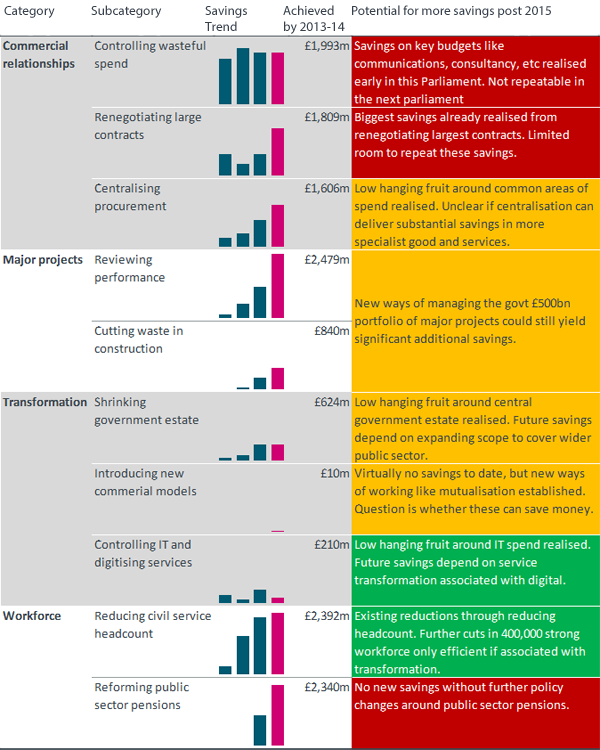Autumn statement: Whitehall must set itself up for efficiency challenge
The Chancellor sets an ambitious goal - can it be achieved?
In the Autumn Statement, the Chancellor has announced that he intends to make £10bn in efficiency savings by 2017-18. This is a stretching target which the government will only be able to meet if it focuses on transformative change and equips itself with the right tools and structures for the job.
Achievable but ambitious This is a continuation of the Government’s focus on making savings since 2010, which we have commented on previously. As the table below this post shows, the current efficiency drive has probably reached its limits in terms of driving out pure waste, with a large portion of the savings to date coming from items such as contract renegotiations and controls on back-office spend which cannot be replicated. As we have argued elsewhere, the scale of the fiscal challenge will require changing how government works, and this also applies to the efficiency target announced today. The detail in the published documentation suggests that the Government recognises that transformation of services and ways of working is needed to achieve further savings: it expects savings to come from areas such as digitising services and transforming business models. Up to the job If the efficiency savings are to be successful, we need to see Whitehall working to equip itself for the task, giving government the right tools and structures. This should start with the Civil Service leadership – the 'triumvirate' of the Head of the Civil Service, the CEO, and the Permanent Secretary of the Treasury – supporting the agenda. The Treasury will need to work closely with Cabinet Office: if past reform efforts are anything to go by, having the Treasury on board is a condition of success. In the current situation, however, the Treasury's buy-in matters even more as a lot will depend on how it can lead and support the finance function for which it is responsible. Other civil service functions will need to gear up for action as well, including commercial and programme management. These have traditionally played second fiddle to policy but the government's ambitious objectives require that the civil service leadership empower and support the leaders in these areas – starting with areas like the Major Projects Authority which needs stable leadership. Stay transparent Some previous efficiency drives with big headline targets have resulted in little more than ‘silly counting’. Without strong incentives for real change, targets are gamed and illusory savings are reported. This government's efficiency agenda has been encouraging in the rigour and transparency it has displayed about savings. This will need to be built on. There is potential for improvement, for instance it could be made clearer to the public which savings are new and which recur in each successive year. The government will also need to further develop credible methods for evidencing savings in areas where doing so is not as straightforward as comparing outturn to baseline – particularly as it comes to rely more heavily on transforming services and business models. In short, if in a few months there are no signs that government has set itself up for the challenge, the effort will fail.
This table shows the profile of savings in each of the areas the Government has reported on, and our assessment of the potential for savings in the next parliament.

- Topic
- Public finances
- Administration
- Cameron-Clegg coalition government
- Department
- HM Treasury
- Publisher
- Institute for Government